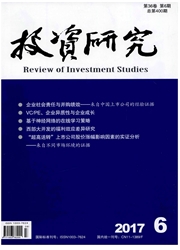

 中文摘要:
中文摘要:
通过收集2000-2014年中国31个省份面板数据,运用广义最小二乘估计方法,本文实证考察了金融资源集聚对企业区位选择和产业集聚的影响。研究表明,传统因素和金融因素对企业区位选择均有显著影响,金融因素对企业区位选择的影响程度整体上要大于传统因素,并呈上升趋势,其中银行业集聚和保险业集聚有利于企业区位选择,而证券业集聚则不利于企业区位选择;传统因素对企业区位选择的影响呈现出较大的差异性,市场需求和交通便利度对企业区位选择产生正效应,影响程度有上升趋势,土地成本和劳动力成本对企业区位选择产生负效应,土地成本的影响程度略有上升,劳动力成本的影响程度则有大幅度下降。在影响产业集聚的因素中,金融因素总体上也要高于传统因素,影响程度也呈上升趋势,证券业集聚对产业集聚的影响程度甚至超越了银行业集聚;传统因素中,土地成本和劳动力成本不利于产业集聚,而市场需求和交通便利度的提高则对产业集聚产生正效应,除劳动力成本对产业集聚的影响程度有大幅度下降外,其他三个因素对产业集聚的影响程度均有不同程度的提升。
 英文摘要:
英文摘要:
By collecting the Panel Data of Chinese 31 Provinces' enterprises of 2000 - 2014, and adopt the generalized least square estimation method, the paper empirical research the impact of financial resources agglomeration on enterprise location selection and industrial agglomeration. The study shows that traditional and financial factors have a significant impact on the location choice of enterprises, and the influence of financial factors on the location choice of enterprises is greater than the traditional factors. The agglomeration of banking and insurance is advantageous to the enterprise location choice, and the securities industry agglomeration is conducive to enterprise location choice; The influence of traditional factors on the enterprise location choice has a bigger difference, the market demand and the convenient transportation have a positive effect on the location choice of the enterprise, the cost of land and labor have a negative effects on the location choice of enterprise. In all the factors, the influence of financial factors also higher than the traditional factors,the impact of securities industry agglomeration is even greater than the banking industry. The traditional factors of land costs and labor costs are not conducive to industrial agglomeration, while the market demand and transportation convenience have a positive effect on industrial agglomeration.
 同期刊论文项目
同期刊论文项目
 同项目期刊论文
同项目期刊论文
 期刊信息
期刊信息
